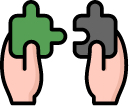April - Autism Awareness Month
April - Autism Awareness Month
Here at ISC, some members of our team have children on the autistic spectrum, and we (as a company) recognise the challenges that this can bring. ASD (autism spectrum disorder) is a lifelong condition that is being increasingly diagnosed in modern society. April is autism awareness month, so as a salute to those on the autistic spectrum, and to those who care for them, we have asked one of our team (Simon Harris) who is significantly impacted by living day to day with autism (through his daughter Darcy) for some insight into what concerns him the most and how he approaches life with autism.
“As a parent of a child on the autistic spectrum my hopes and dreams for my daughter are somewhat different to those that other parents might have.
“Before she was diagnosed, (aged 3), my hopes for Darcy were the same as most parents. I hoped that she’d grow up to have a rewarding career, a loving partner, and a long happy life. After diagnosis, my hopes and dreams were altered. Initially I hoped that one day she might be able to say “Daddy, I love you”, but sadly even that dream looks like it will never happen, as Darcy (now 21) is entirely non-verbal. The best I can hope for is that she is happy in a world that she finds hard to understand, and which doesn’t understand her.
“Darcy has many challenges: she is non-verbal, she is highly sensitive to noise and smells, doesn’t understand simple basic concepts like the past, the future, numbers, money, speech, danger, etc. You get the picture. Perhaps her greatest challenge is her frustration when she can’t communicate what she wants. Her autism comes with meltdowns, which include self-harming. We live our lives on a knife-edge, always trying to help her to avoid a melt-down. Some triggers we know and can control. Some we either don’t know or can’t control. It is these which cause us the most concern.
My wife and I have learnt that there is no such thing as “in a minute”. When Darcy wants something, we need to respond immediately or risk melt-down. This means dropping whatever you are doing, no matter how urgent or important. It doesn’t matter if we’re cooking, eating, gardening, decorating, watching tv, speaking to someone,… anything. You have to stop, and you don’t know when you’ll be able to resume. Oh… and this happens at least 20 times every day!
Patience, acceptance and understanding are characteristics that we have to have in abundance. All at the same time as maintaining energy, excitement and enthusiasm, no matter how tired or rotten we feel. Caring for our amazing, unique, wonderful, and challenging daughter is a full-time two-person job, 24/7, 52 weeks a year.
A particular worry for us, is people who jump to conclusions at Darcy and her behaviour. When in public, when Darcy’s demeanour strays from what is socially acceptable, we know that we are being looked at and judged. Most people think first, then accept it and sympathise, but a few will stare, comment, or take exception. It’s heart-breaking to see Darcy being cold-shouldered, pushed aside, and sometimes even threatened when she is just being her autistic self. Inside, she is pure, innocent and totally without agenda. She just wants to touch, smell, look, or make friends and move on. And we as parents also get judged for failing to control her to the point of her behaviour all being confined to “the norm”.
Whilst our daughter is profoundly autistic at the low-functioning end of the spectrum, I would like to sing the talents of those diagnosed with autism at the high-functioning end. Many are blessed with “gifts” which us mere mortals do not possess, and which (in the right job) make for the perfect skills set. Numbers, patterns, organising chaos, observation, meticulous attention to detail etc. can be common attributes of such individuals. They may not interview as well as other candidates, but if focus and loyalty are what is required you can rarely find better. And of course many possess the ability to question, think tangentially, and introduce new concepts. It is well documented that great historical “game changers” in human history displayed behaviours that today would be considered autistic. Da Vinci, Newton, Darwin and Einstein are just a few. And where would we be today without some of their vision and “out of the box” thinking? It is my hope that increasing numbers of employers will see the opportunities that using similar special individuals can bring.
I am sad to say that my own daughter will never achieve such heights. Darcy will always require care and support. It shows just how diverse the autistic spectrum can be. But she will always be my baby girl, and I will always love her. Marriage? No. Career? No. A long and happy life? I sincerely hope so.
Against this difficult backdrop of unwavering care and attention for Darcy, I feel an immense sense of gratitude to my employers… ISC. If I need to flex my hours or working days (I work part-time) there is never a problem. If I have to unexpectedly decline a meeting at short notice, it is rearranged, or I am excused and debriefed afterwards. Often, autism is harder on the carers than it is on the person affected. Having an understanding, flexible and pragmatic employer makes a huge difference. Without it, I am not sure I’d be able to continue to work, and I hope that other employers follow this lead. I am eternally grateful.

We listen to your needs

We understand your challenges

We provide solutions

We help with implementation
